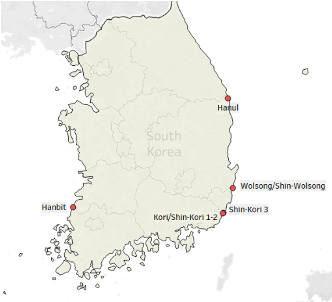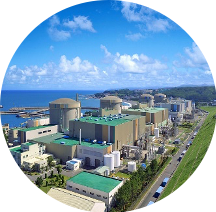Highlights
15,243.9 MTU spent nuclear fuel in storage (2017)
32,136 MTU spent nuclear fuel projected by 2050
1978 First year of commercial nuclear operation
24 operating nuclear power reactors
2 operating research and test reactors
4 nuclear power reactors under construction
23.5 GW(e) installed nuclear capacity (2018)
23.67% nuclear share of domestic energy production (2018)
Regulator: Nuclear Safety and Security Commission (NSSC)
Power Operator: Korea Hydro & Nuclear Power (KHNP)

Management and Disposal of Spent Nuclear Fuel
Practices
- Fuel is stored wet at NPPs and in wet storage at HANARO research site (KRR-1 fuel was returned to the U.S. in 1998)
- CANDU reactor fuel is stored for 6 years wet before transfer to dry storage
- A centralized interim storage facility will likely not be operational until at least 2035
- The nuclear operator, KHNP, pays the Korea Radioactive Waste Agency (KORAD) the equivalent of 705 USD per kilogram of spent fuel
- Site selection for a final waste repository as prescribed by the 2016 National Policy on High Level Radioactive Waste Management is still in the preliminary stage, and will likely be completed around 2030, with operation beginning in the mid-2050s
- The South Korean government has also considered disposal in another country’s repository
- Since 2011 KAERI has partnered with the United States to study pyro-processing technology, which separates and recycles spent fuel for use in fast reactors
Obligations

- South Korea’s safeguards agreement with the IAEA (INFCIRC/236) entered into force in 1975 and the additional protocol in 2004
- South Korea signed the Joint Convention in 1997 and ratified in 2002
- The Radioactive Waste Management Act guides safety in waste management
- South Korea has an open fuel cycle in accordance with its 1974 US 123 Agreement
- The agreement banned South Korean fuel reprocessing, and KHNP, the sole NPP operator, has determined that reprocessing abroad is too costly
- The Ministry of Knowledge and Economy (MKE) and the Korea Electric Power Corporation (KEPCO) are responsible for radioactive waste management


